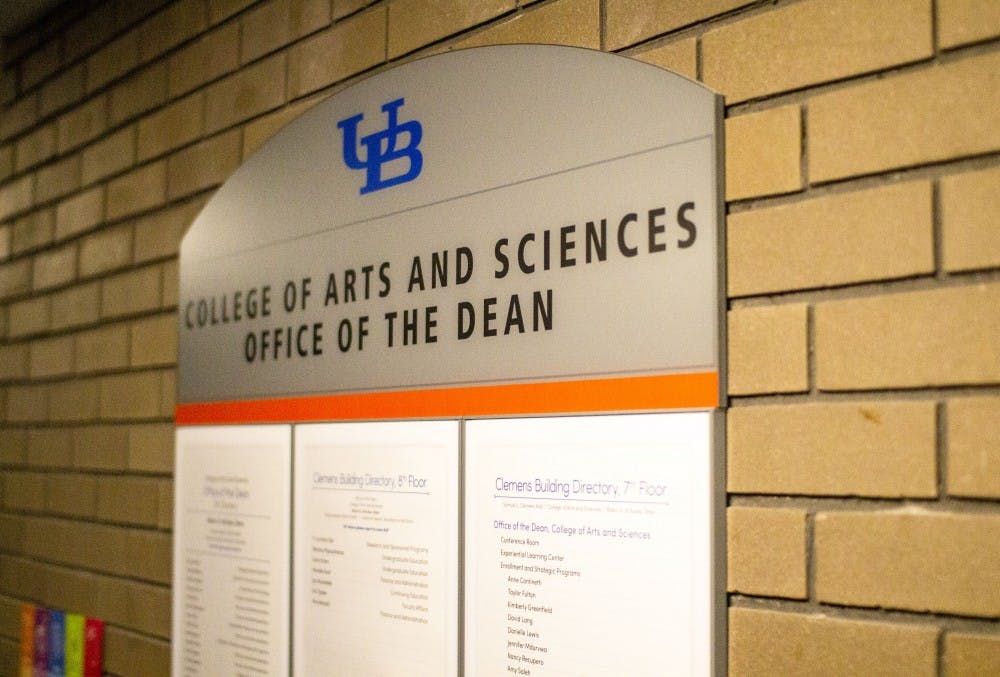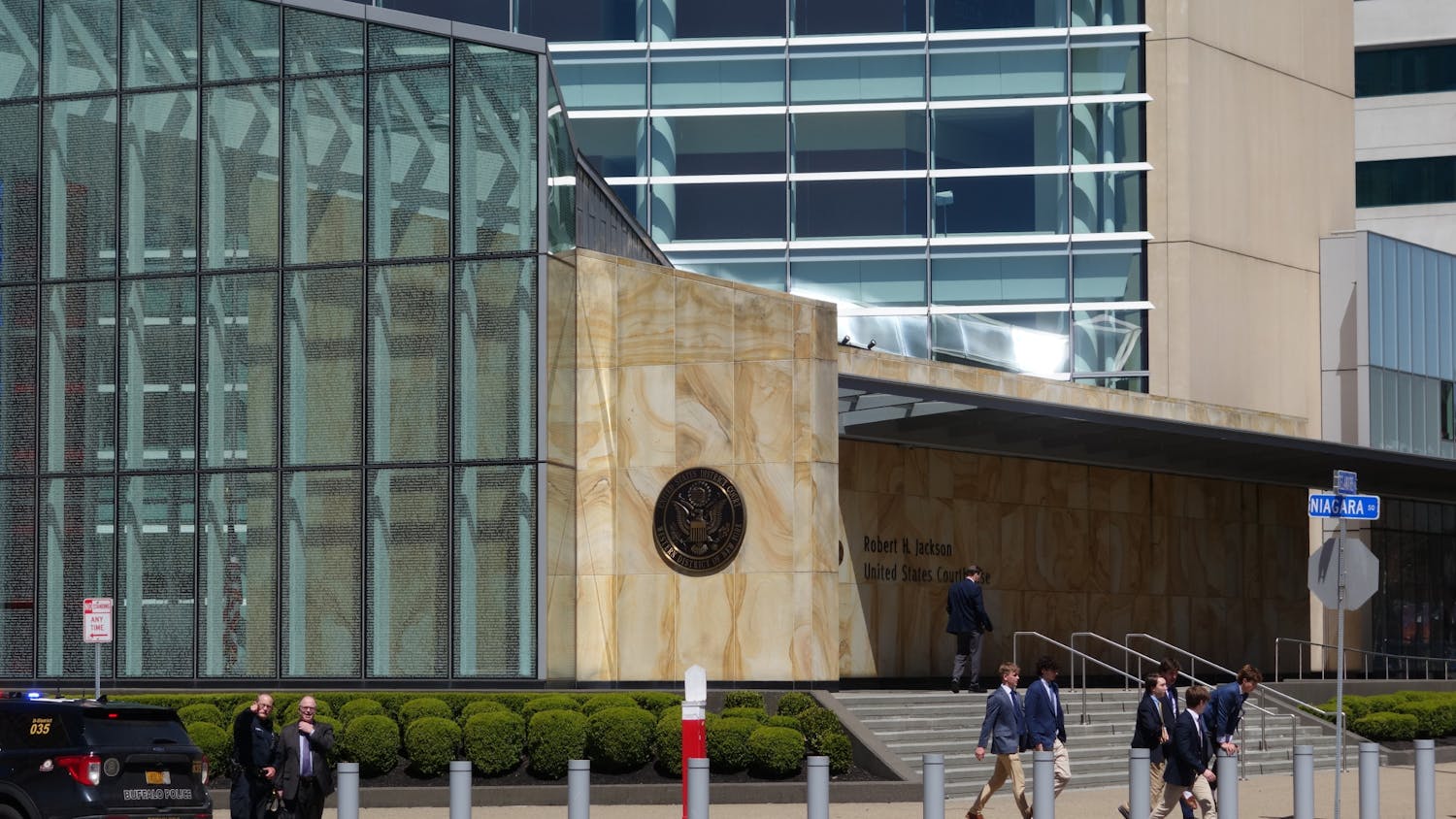Students and faculty are upset and confused by the College of Arts and Sciences’ announcement last week that it will halt funded Ph.D. recruitment in 23 of 29 departments for the 2020-21 academic year.
On Wednesday, Dean of the College of Arts and Sciences Robin Schulze responded to concerns the announcement caused by apologizing for “missteps” and seeking faculty input.
“The move that I have attempted to get us on secure financial footing is obviously not the right one for the faculty. I apologize for moving too quickly. Please, please help me design a process that works for all in the current budget environment,” she wrote in an email to faculty.
The email led some faculty and students to believe she was rescinding the pause. But, Gina Cali-Misterkiewicz, spokesperson for the dean, told The Spectrum the decision stands for the moment. “Recruitment is paused until further discussion with faculty,” Cali-Misterkiewicz wrote.
Faculty and graduate students have expressed outrage since the decision –– delivered via an email from Associate Dean of Graduate Education for CAS David Johnson –– circulated last week. Screenshots of the email proliferated on social media and The Chronicle of Higher Education featured a story on the cuts and on faculty and student uncertainty. Faculty and students say they were surprised by Johnson’s email and say a decision to reduce 50% of funded CAS Ph.D. students for a year should have involved more discussions and campus-wide input. They also insist it should have taken into account the impact a drop from 120 to 55-60 new Ph.D. students would have on UB’s reputation as a research university and on departments’ abilities to attract top talent. The 23 departments would still be allowed to recruit Schomburg and Presidential fellows into their programs as these students receive separate funding.
English professor James Holstun called the recruitment pause a “highly destructive” act that has caused the “biggest uproar” he has seen in CAS faculty in the past 30 years. Kenneth Dauber, also an English professor, called the plan “the end of the College [of Arts and Sciences] as a serious intellectual institution,” according to an email from the Living Stipend Movement.
Willis McCumber, an English Ph.D. student, said he thinks it’s a “horrible policy” to imply that the only way to realize the Ph.D. Excellence Initiative is to make “sharp reductions” in recruitment.
“I’m glad everyone seems to be taking this really seriously,” McCumber said. “And I’m glad it seems CAS administration are showing signs of flexibility within the original announcement.”
Schulze will speak about the cuts with faculty at 2:30 p.m. on Friday. The meeting is the result of a petition circulated by the CAS faculty senators, which garnered 90 signatures and is endorsed by the United University Professions, the union representing faculty.
On Aug. 23, UB announced a stipend floor increase to $20,000 as part of the “Ph.D. Excellence Initiative,” an unanimous decision by the deans, to “enhance Ph.D. students’ educations.”
UB spokesperson John DellaContrada reiterated that CAS planned for the recruitment freeze to last one year. For 2021-22, CAS will need to find money in its allocated budget from the university to maintain the new stipend floor, since the Provost’s office is only providing 100% bridge-funding for one year.
CAS is pausing recruitment because the college “won’t be able to afford the amount of students it normally recruits” after this academic year, Johnson said.
Sambandamurthy Ganapathy, chairman of the physics department, and Xuedong Hu, a professor and director of graduate studies in the physics department, wrote in an email that the decrease in recruitment will “significantly affect” their department’s ability to offer the same number of laboratory and recitation sections for large introductory courses as they have in previous semesters.
“[The freeze] will impact our pool of graduate students therefore affecting our research program for years to come,” Ganapathy and Hu wrote in a joint statement.
“I question the budgetary flexibility of CAS to have to do this in such a way, but I think when they sit down and look at it, they know what’s coming,” Michael Montoro, UB Council student representative, said. “If in three years there’s no money for it, it’s unfunded.”
The departments of biology, communicative disorders and sciences, communication, chemistry, geology and psychology are exempt from the freeze and can continue to recruit funded Ph.D. students because they have the “highest demand and job outcomes” for students, Johnson said. CAS plans to recruit 25-30 total funded Ph.D. students into the six exempt departments in 2020-21.
The Provost’s Office is providing the funds –– $5,500 per student stipend –– needed this year to “bridge” the gap. However, the office will decrease funding over the next three years and only provide 50% bridge-funding in 2020-21, 25% in 2021-22 and nothing in following years.
“The part of the Ph.D. Excellence Initiative no one wants to talk about is how it’s being paid for,” Johnson said. “The only way the college can sustain [the initiative], with all its benefits and not just the raised stipend, and to pay for it, is to reduce, over a three year period, the number of Ph.D. students we support.”
Philip Glick, professor of surgery and management and former Faculty Senate chair, said the graduate students’ argument last year when requesting a “living wage” was to increase the university’s whole budget, not just the stipends.
“If you’re going to increase people’s wages, but not increase the amount of money allocated to them, you have to hire less people,” Glick said. “So, I applaud CAS for increasing the living wage, but they didn’t get any increased money.”
Glick said UB put the “nail in the coffin” in only providing 100% bridge-funding for one year, because deans have to budget for years ahead.
“You can’t commit to a graduate student for four to five years and know you’re not going to have enough money for them,” Glick said.
McCumber said he thinks it’s misleading to say the recruitment cuts are necessary because the Provost’s office can provide 100% bridge-funding for the current year.
“No one has made any kind of convincing case that it’s not available for more years beyond that,” McCumber said. “They’ve argued since the beginning that their central operating budget isn’t sufficient to cover raised stipends. I just think that’s not true.”
Of the 2,347 total Ph.D. students at UB, 1,400 receive stipends. Some students say this number is “a mirage.” Roughly 900 of those not receiving stipends are in the graduate school of education or are adjuncts who reached the end of their five-year contract and now work for their departments or the writing center, but aren’t funded by the university, according to Montoro.
“Unfunded Ph.D. students is not how a No. 1 research university runs, not how it ever ran, not how it will run ever in the future,” Montoro said. “The discussion about unfunded Ph.D. students and these weird technicalities is a distraction from the overall picture of what’s going on.”
Johnson said CAS hopes to recruit 60 funded Ph.D. students, including 35 total fellows across the college for 2020-21, 80 funded Ph.D. students for 2021-22 and 100-110 funded Ph.D. students for 2022-23, including 40 fellows.
Schulze announced on Wednesday she is forming two committees: a “broad interdisciplinary” committee and a committee of faculty from across CAS. The interdisciplinary committee, led by Johnson, will determine how to distribute resources for teaching assistants and research assistants to recruit the best Ph.D. students with the best outcomes. The faculty committee, led by geography professor Sean Bennett, will work to improve Ph.D. student job placement.
Holstun said Schulze introduced the “radical” resolution without consulting faculty on the CAS Policies committee, which “sent the whole college into turmoil.”
“The administration, in other words, is ignoring its students, its faculty and its own governance documents, for inexplicable reasons,” Holstun said. “It’s the job of the administration to see to it that their funded graduate students are supported at a level that will enable them to focus on their teaching and research. They have failed at their job. They should start taking it more seriously, or seek different jobs.”
Schulze and Johnson said the choice is a “financial necessity” and became imperative last month after the university announced the increase in Ph.D. stipends to a minimum of $20,000. No current students are losing their jobs or being denied funding, but the college cannot recruit to “directly replace” students who are coming off funding, Johnson said.
“We had to tell most departments they can’t recruit to directly replace students coming off funding on a one-to-one ratio,” Johnson said. “Instead they have to recruit to try to get Schomburgs and Presidentials.”
CAS hopes to recruit roughly 10 Schomburg and 25 Presidential fellows into its departments next year. CAS will ask the graduate school to increase these fellowships from $7,500 to $10,000 and to cover five-year funding for Ph.D. students instead of four. Students on these fellowships receive the $20,000 stipend along with the fellowship money, meaning they would receive a funding package of $30,000 per year exclusive of fees, which will be paid.
Johnson said he believes CAS will benefit overall from the Ph.D. Excellence Initiative, despite the temporary recruitment drawback.
The initiative, he said, will remove first-year funded Ph.D. students from teaching, allow them to integrate into their graduate studies without this “pressure.”
“The Ph.D. Excellence Initiative ought to position us to recruit the best students in the country, there’s a lot of fear [that the reduction of Ph.D. student recruitment] will threaten programs, but I don’t see how that will happen,” Johnson said. “I think if you have the opportunity to recruit better students into programs with reasonable outcomes, you have a great chance to get the very best students and have a thriving Ph.D. program.”
Johnson said he thinks people in CAS are unhappy because they feel the Ph.D. Excellence Initiative has been “imposed on them from above.”
Johnson said CAS didn’t have much time to discuss the recruitment pause, but he thinks the college made the right decision.
“I think it would have been a wrong decision to start the stipend raise next year and only for new students,” Johnson said. “So we had to extend it to everyone immediately and that meant we had to begin reducing the number of students as quickly as possible, because in order for CAS to be able to pay for this without the Provost’s continued help, we will have to catch up quickly and reduce the number [of funded Ph.D. students] from 650 to 525 within three years.”
The English department has roughly 75 doctoral students in its current Ph.D. program. Of these students, 75% are fully funded and the remainder are largely students whose initial funding packages have expired and are now teaching adjuncts, according to Damien Keane, director of graduate studies for the English department.
At the end of the 2016-2017 academic year, the department voted to stop accepting self-funded students, an option it could take because of its size. Currently, the department has 17 students who hold Presidential fellowships and three who hold Schomburg fellowships, according to Keane.
Keane said the manner in which the admissions “hiatus” and the plan behind it were handled have already had negative effects on how prospective students are thinking about the program.
“In the last few days, staff in the department’s graduate office and I have received messages from potential applicants to the Ph.D. program, who are seeking clarification of the funding situation and whether they can or should apply,” Keane said. “Such queries gesture toward the real problem. One fears that many potential applicants are simply not asking.”
Keane called the decision to decrease enrollment “one-way and non-existent” communication.
LSM has been protesting for a “living wage” for two and a half years. LSM members say they are concerned and surprised with the “severity” of the decision. They have already put together a petition to request 100% bridge-funding for five years, to bring together the Living Stipend Solutions Committee, which was passed by Faculty Senate last year, and would incorporate students, faculty and administration. LSM also has plans to protest, which members hope faculty will support.
“The Provost’s office needs to commit to 100% funding for five years so that in time they can bring together the Living Stipend Solution Committee and have some kind of governed means for how [the Excellence Initiative] is implemented,” Montoro said. “This would create enough time so that it doesn’t force CAS to make such drastic decisions like this.”
Macy McDonald, an English Ph.D. student, said she thinks there’s a lot of “panic” and “confusion” right now, because so much of what will happen is unknown.
“We’re in a situation where we don’t know exactly what will happen, but what we do know is that this decision was implemented without the consideration of faculty or graduate students,” McDonald said.
She said pausing recruitment for a year could “destroy” vulnerable departments.
“It’s true that some recruitment is happening with the fellowships, but we’re just now finding out that those students are incredibly difficult to recruit,” McDonald said. “Otherwise we’d already have as many as possible, and it will be even harder to recruit them in smaller cohort sizes.”
Montoro agreed, saying this could be “close to the end” for some departments.
“For smaller departments like anthropology, sociology or transnational, a recruitment freeze for a year is essentially a final straw in the beginning of the end.”
Brittany Gorny is the senior news editor and can be reached at brittany.gorny@ubspectrum.com and on Twitter @BrittanyGorny.
Brittany Gorny is the senior news editor.





